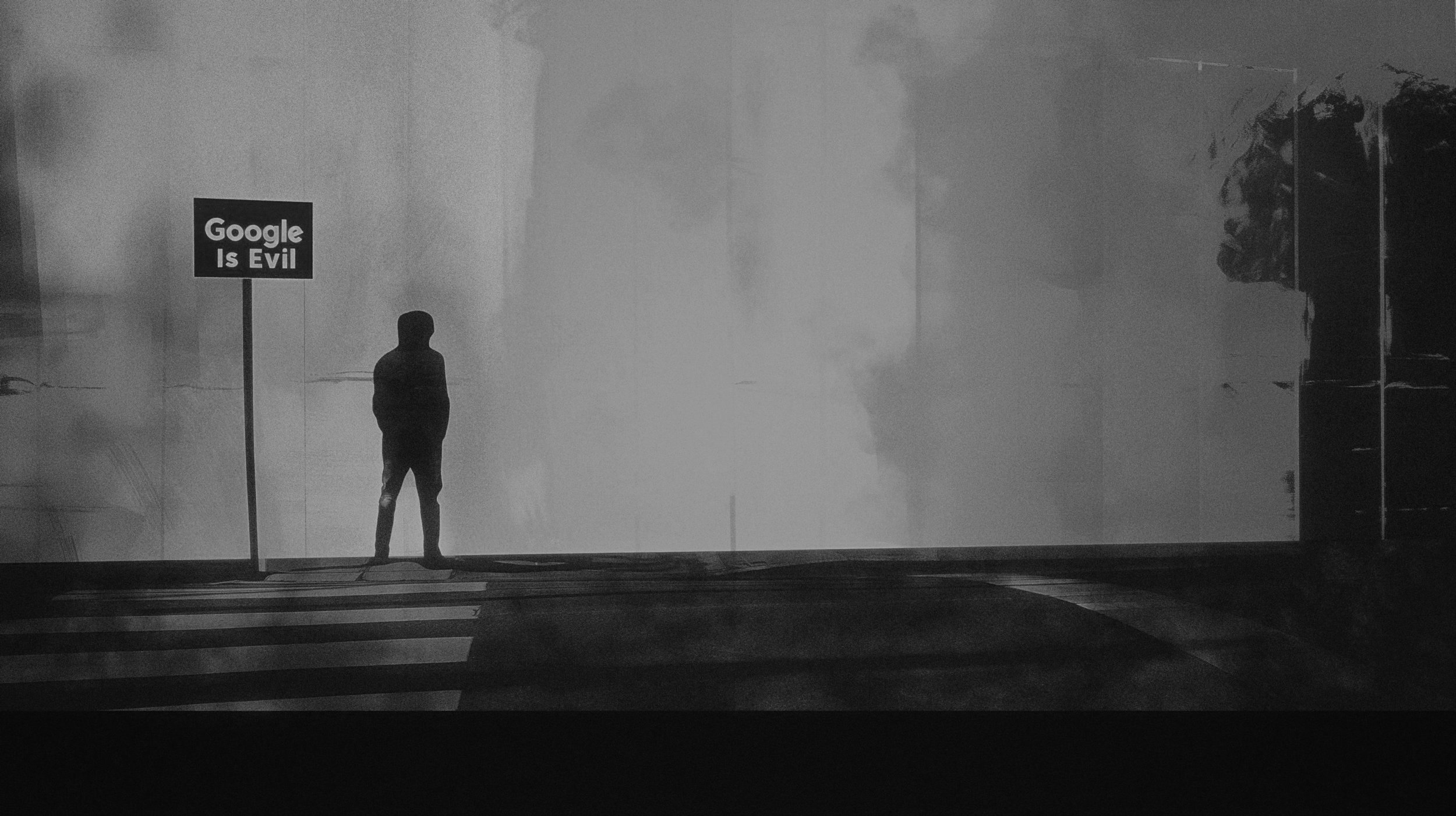Beyond ‘Don’t Be Evil’

A Fable About Tech, Power, and Your Fight for Freedom
In the bustling heart of Silicon Valley, a place where dreams are coded into reality and the future is just a startup away, Adam found himself at the helm of a bold venture. This wasn't just any startup; it was a vision of a digital space that fostered genuine connection and community, a beacon in the increasingly impersonal expanse of the internet. Adam, with his unwavering belief in the power of technology to bring people together, was determined to make this vision a reality.
The journey began in a small, cozy coffee shop that seemed to hum with potential and the promise of new ideas. Here, amid the aroma of espresso and the soft murmur of conversations, Adam shared his dream. He spoke passionately about creating a platform that prioritized the user's experience, one that valued privacy and transparency above all. His words resonated with those who listened, drawing a small but dedicated team to his side.
However, as Adam's venture began to take shape, so too did the obstacles. Giants dominated the digital landscape and were none more imposing than Google. Once heralded for its commitment to "Don't be evil," Google had subtly shifted its mantra to "Do the right thing"—a change that, while seemingly minor, signaled a profound transformation in the tech giant's approach to its immense power and influence.
For Adam and his team, this evolution of Google was more than just corporate rebranding; it was indicative of a broader shift in the tech industry—one that threatened the very principles they were fighting to uphold. The challenge was not just to build a new platform but to navigate a marketplace that was increasingly shaped by the whims of a few influential players.
Determined to stay true to his vision, Adam led his team with a focus on integrity and the relentless pursuit of innovation. They worked tirelessly, refining their platform, engaging with their growing community, and always looking for ways to protect the privacy and dignity of their users. Yet, despite their efforts, they found themselves constantly overshadowed by Google's vast reach and resources.
During a late-night brainstorming session, the kind where the best ideas often emerge from sheer exhaustion, Adam had a revelation. He realized that their struggle against Google was not just a battle for market share but a fight for the soul of the internet. This was about more than just one startup's success; it was about advocating for a digital world that valued individuals not just as data points but as people with stories, dreams, and rights.
This epiphany became the cornerstone of Adam's mission. He began to speak out, not just about his platform, but about the broader implications of allowing a few tech giants to dictate the future of the internet. His message struck a chord, resonating with users and other small startups alike. Together, they started a movement that championed the free market, capitalism, truth, and the protection of personal freedom online.
As their movement gained momentum, Adam and his team faced increased scrutiny and challenges, not just from Google but from those who doubted their ideals' feasibility in the cutthroat tech world. Yet, these challenges ultimately brought them closer together, forging a bond rooted in shared values and a common purpose.
Ultimately, Adam's journey was not just about the success or failure of a single venture. It was a testament to the power of resilience, the importance of staying true to one's values, and the impact a small group of dedicated individuals can have on shaping the future. His story serves as a reminder that in the vast, often overwhelming world of technology, there remains a place for integrity, community, and the relentless pursuit of doing the right thing.
And so, the fable of Adam and his venture unfolds not as a tale of triumph against all odds but as a narrative of hope, a call to action for all who believe in the potential of technology to unite us, to lift us, and to create a digital world that reflects the best of who we are and aspire to be.
As Adam's movement gathered strength, uniting voices from corners of the digital world previously unheard, a deeper understanding began to crystalize within him. It wasn't just about creating an alternative platform or advocating for privacy and user dignity—this was a much larger battle. It was about safeguarding the very foundations of free markets, protecting individual freedoms, ensuring the preservation of civil liberties, and defending the sanctity of freedom of speech against an entity that had grown too powerful.
Adam came to see Google (and later, Alphabet) not merely as a competitor but as a symbol of what happens when too much power accumulates unchecked. With its unparalleled access to information and integral role in the digital and physical lives of billions, the tech giant had become a de facto gatekeeper of the internet. Its influence over what could be seen, shared, and spoken was not just a threat to competitors but to society itself.
This realization marked a turning point for Adam. He understood that his fight was not solely for the success of his venture but for the future of the digital landscape as a whole. The principles he stood for—truth, privacy, and freedom—were at risk of being overshadowed by the convenience and ubiquity of a single corporation's ecosystem.
Dedicating his life to challenging this behemoth, Adam shifted his strategy. He began reaching out beyond the tech industry, speaking to lawmakers, educators, everyday citizens, and activists, sharing his insights and concerns about the implications of Google's dominance. He wrote op-eds, appeared on panels, and participated in debates. He called for a reassessment of antitrust laws and advocated for measures to ensure the internet remained a free, diverse, and competitive marketplace.
Adam's message was clear: breaking up Google was not about dismantling a successful company but about preserving the principles the internet was built upon. It was a call to action to prevent any single entity from having the power to dictate the flow of information, influence public opinion through algorithmic control, and infringe upon individuals' freedoms worldwide.
His dedication sparked a broader discussion about the role of tech giants in our society and the need for a regulatory framework that could adapt to the unprecedented challenges of the digital age. Through town halls, workshops, and public forums, Adam fostered a dialogue transcending political and ideological divides, uniting people around the common cause of ensuring that the many, not the few, would shape the digital future.
Adam's journey from an ambitious entrepreneur to a visionary advocate for digital rights and freedoms underscored a fundamental truth: the fight for a free, fair, and open internet is not just a technological challenge but a societal imperative. By dedicating his life to this cause, Adam challenged the status quo. He inspired a generation to envision and work toward a digital landscape that upheld the values of freedom, truth, and democracy.
As the narrative of Adam's life unfolds, it serves as a beacon of hope and a call to arms, reminding us that the power to shape the future of the internet lies not in the hands of a few corporations but in the collective will of the global community. It is a testament to the enduring spirit of innovation, the unwavering commitment to the truth, ensuring personal freedom, and the relentless pursuit of a world where technology serves to uplift humanity, not to control it.
adage, emmy, telly & webby award-winning digital marketing consultant for purpose-driven food & beverage brands.





